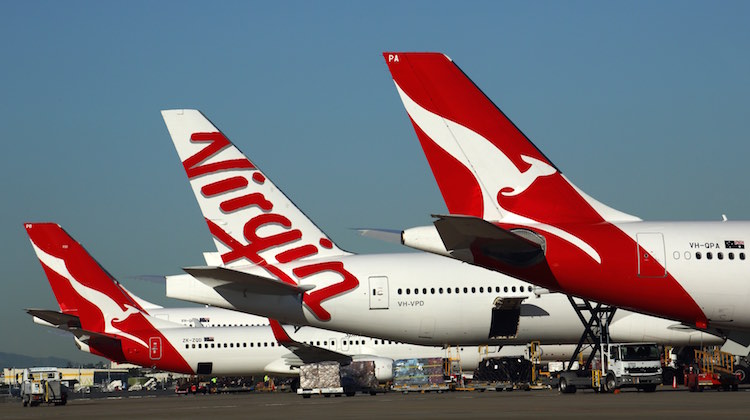Investors have sent Qantas and Virgin Australia shares tumbling amid ongoing market jitters over the UK’s exit from the European Union and rising oil prices.
Qantas slid four per cent, or 12 cents, to $2.61 by the close of trade on the Australian Securities Exchange on Tuesday. There were also sharp falls in Virgin shares, which ended the day down seven per cent, or 1.5 cents, at $0.21, levels not seen since 2009.
Their declines outpaced the weakness in the broader Australian share market, which closed three per cent lower.
“In broad terms, what we are seeing today is a continuation of a previous downtrend. On a day of weakness, they are just not finding the support,” CMC Markets chief market strategist Michael McCarthy said on Tuesday.
“With oil prices rallying – doubling almost from lows of about $26 a barrel to be sitting just below $50 – a lot of the benefit of that cheaper oil has rolled off and the pressure that we are seeing on airline prices is, not solely, but largely reflective of those increased energy costs.
“That, and the concern that international business for airlines will be be hurt by what is going on in the UK and Europe.”
The falls were relatively modest compared with the carnage on European markets overnight, where easyJet tumbled 22 per cent, Ryanair lost 14 per cent and the parent company of British Airways and Iberia, IAG, shed 16 per cent in London trading.
The International Air Transport Association (IATA) said the vote to leave the European Union would result in fewer UK air travellers.
“Preliminary estimates suggest that the number of UK air passengers could be 3-5 per cent lower by 2020, driven by the expected downturn in economic activity and the fall in the sterling exchange rate,” IATA said in a research note.
“In other words, the outcome of yesterday’s referendum could reduce air passenger growth by 1.0-1.5 percentage points each year over the near term.”
While a lower pound could encourage more travellers from overseas to visit the UK, IATA said this would not fully offset the negative impact on outbound travel.
IATA said the immediate impact on the UK freight market was less certain.
“Over the longer-term, however, there will be an impact on international trade when the UK does formally exit the EU and this, in turn, will affect air freight,” IATA said.
“For example, the OECD estimates that UK trade volumes could fall by 10-20 per cent over the long run (to 2030), relative to the baseline.”
Depending on the terms of the UK’s withdrawal from the EU, the UK government could seek membership of the European Common Aviation Area and therefore maintain access to the Single Aviation Market, negotiate its own agreement with the EU for market access, or have no formal arrangement.
“A big issue is with aviation regulation. The UK faces a trade-off between accessing the European Single Aviation Market and having the policy freedom to set its own regulations,” IATA said.
A research note from aviation thinktank CAPA – Centre for Aviation said joining the ECAA would be the most likely outcome.
However, CAPA noted should the UK be unable, or unwilling to replicate the existing market access arrangements for airlines post-Brexit, consumers faced the prospect of higher ticket prices.
“The LCC revolution in Europe was largely the result of market deregulation in the 1990s. The increase in competition that flowed from this was one of the factors leading to lower fares,” CAPA said in a research note.
“Any reversal of this process, leading to increased restrictions on market access (eg by UK airlines on intra-EU routes, not just from the UK to the new EU, or by EU airlines flying from the UK to third party EU countries), could result in fare increases. Consultancy Oxera has estimated that such restrictions on market access could lead to UK passenger fares rising by 15 per cent to 30 per cent.”
















